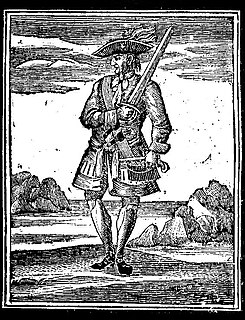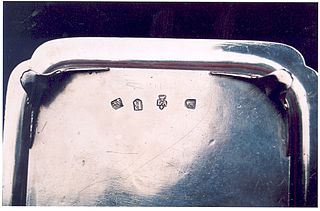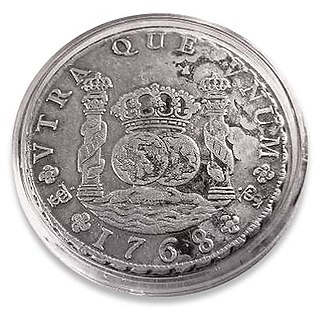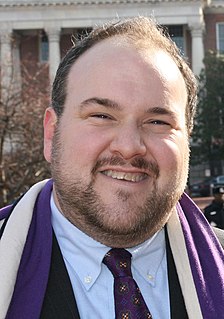
Anne Boleyn was Queen of England from 1533 to 1536 as the second wife of King Henry VIII. Henry's marriage to her, and her execution by beheading, made her a key figure in the political and religious upheaval that was the start of the English Reformation. Anne was the daughter of Thomas Boleyn, 1st Earl of Wiltshire, and his wife, Lady Elizabeth Howard, and was educated in the Netherlands and France, largely as a maid of honour to Queen Claude of France. Anne returned to England in early 1522, to marry her Irish cousin James Butler, 9th Earl of Ormond; the marriage plans were broken off, and instead she secured a post at court as maid of honour to Henry VIII's wife, Catherine of Aragon.

The British crown, the successor to the English crown and the Scottish dollar, came into being with the Union of the kingdoms of England and Scotland in 1707. As with the English coin, its value was five shillings.

John Rackham, commonly known as Calico Jack, was an English pirate captain operating in the Bahamas and in Cuba during the early 18th century. His nickname was derived from the calico clothing that he wore, while Jack is a nickname for "John".

Mary Read, also known as Mark Read, was an English pirate. She and Anne Bonny are two of the most famed female pirates of all time, and among the few women known to have been convicted of piracy during the early 18th century, at the height of the Golden Age of Piracy.

The siliqua is the modern name given to small, thin, Roman silver coins produced in the 4th century A.D. and later. When the coins were in circulation, the Latin word siliqua was a unit of weight defined by one late Roman writer as one twenty-fourth of the weight of a Roman solidus.
"Siliqua vicesima quarta pars solidi est, ab arbore, cuius semen est, vocabulum tenens."
A siliqua is one-twentyfourth of a solidus [coin] and the name is taken from the seed of a tree.

Anne Bonny was an Irish pirate operating in the Caribbean, and one of the most famous female pirates of all time. The little that is known of her life comes largely from Captain Charles Johnson's A General History of the Pyrates.

Woodes Rogers was an English sea captain and privateer and, later, the first Royal Governor of the Bahamas. He is known as the captain of the vessel that rescued marooned Alexander Selkirk, whose plight is generally believed to have inspired Daniel Defoe's Robinson Crusoe.

Britannia silver is an alloy of silver containing 11 ozt 10 dwt silver in the pound troy, equivalent to 23⁄24, or 95.833% by weight (mass) silver, the rest usually being copper.

Columnarios are silver coins that were minted by Spain from 1732 to 1773 throughout its new colonies in present-day Latin America. While the majority of columnarios were struck in Mexico, smaller mints existed in Guatemala; Lima, Peru; Santiago, Chile; Potosí, Bolivia; and Colombia. The base denomination is an 8 reales coin. Other minor denominations included 4 reales, 2 reales, 1 real, and 1/2 real. The 8 reales coin is the predecessor to the American dollar. Before the United States Mint was in production, columnarios circulated, along with other coinage, in the US colonies, as legal tender until the middle of the 19th century.

Alderwasley is a village and civil parish in the Amber Valley district of Derbyshire, England. The population of the civil parish as of the 2011 census was 469. Alderwasley Hall is the home to one of the sites of Alderwasley Hall School which is a special school for children and young people with Aspergers and/or Speech and Language Difficulties. It is about six miles north of Belper.
Ian Serraillier was an English novelist and poet. He retold legends from England, Greece and Rome and was best known for his children's books, especially The Silver Sword (1956), a wartime adventure story that the BBC adapted for television in 1957 and again in 1971.

Shaun Rogers is an American figure skater. He won silver medals at the 2007 Nebelhorn Trophy and 2008 Finlandia Trophy, two medals on the ISU Junior Grand Prix series, and placed eighth at the 2005 World Junior Championships.

Silver Wings is a 1922 American drama film directed by Edwin Carewe and John Ford. Ford directed only the prologue of the film. The film is now considered to be a lost film.
The Great Recoinage of 1696 was an attempt by the English Government under King William III to replace the hammered silver that made up most of the coinage in circulation, much of it being clipped and badly worn.

Luke Clippinger is an American politician and lawyer from Maryland. A Democrat, he was elected to the Maryland House of Delegates in 2010, representing the state's 46th district in Baltimore. He took office on January 12, 2011.

The crown, originally known as the "crown of the double rose", was an English coin introduced as part of King Henry VIII's monetary reform of 1526, with a value of five Shillings.

The Republic of Pirates is the nomenclature for the base or stronghold of a loose confederacy run by privateers-turned-pirates in Nassau on New Providence island in the Bahamas for about eleven years from 1706 until 1718. Although not a state or republic in a formal sense, it was governed by its own informal 'Code of Conduct'. The activities of the pirates caused havoc with trade and shipping in the West Indies, until governor Woodes Rogers reached Nassau in 1718 and restored the British control.
The International Silver Company , also known as the ISC, was formed in Meriden, Connecticut as a corporation banding together many existing silver companies in the immediate area and beyond.

















